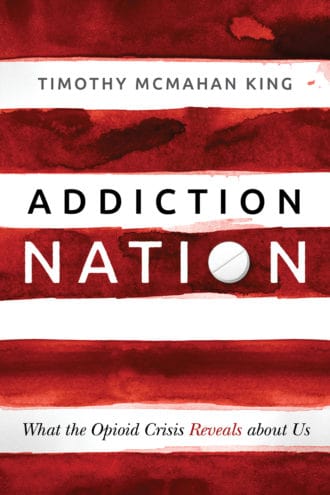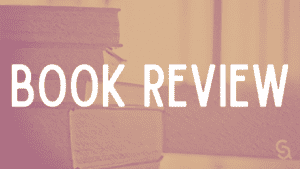
A review of Addiction Nation: What the Opioid Crisis Reveals About Us by Thomas McMahan King / Herald Press, 2019
Like many people, my understanding of addiction has been informed primarily by mass media. I’m an inveterate watcher of 20/20 and the reality program Intervention; I am a consumer of memoirs and movies about those who have drug addictions; I’ve listened to the NPR reports about the nation’s opioid crisis, and read countless newspaper articles that limn the complexities of addiction, the ways drugs like fentanyl and heroin are destroying families and communities. Even though I personally have extended family members affected by addictions, I see their life journeys through a lens shaped—and, arguably, distorted—by the media, which not only affects how I relate to them, but also complicates their ability to find healing and stability.
Thus I am grateful for Timothy McMahan King’s book, Addiction Nation, published this summer by Herald Press. Addiction Nation is framed around King’s own addiction to pain medication following a medical crisis that nearly took his life; the book also relies on King’s well-informed understanding of scripture and theology, providing a comprehensive and much-needed analysis of why so many people in the United States struggle with addiction, and how Christians are called to respond to an addicted nation.
In his early 20s, King underwent a routine medical procedure but experienced immediate complications that put him in the ICU for weeks, and various hospitals for months. During that time, the pain was a constant, unwelcomed companion, and the only relief came from opioids supplied at first intravenously, and then, through fentanyl patches and pills. King describes his medical journey in profound detail, allowing us to have a small sense of the horrors he faced, but also his increased need for a drug that made intense pain tolerable. Only after a doctor told King that he suspected he was developing an addiction to medication did King recognize the path he had taken toward opioid dependency. In some part because his addiction was identified in the early stages, King was able to reroute his course to health and healing.
He did not find recovery alone, of course, nor does he claim that people can rehabilitate without significant help: King writes about receiving help from his observant doctor, who identified symptoms of opioid addiction; help from his family, who supported him through his entire medical journey, including a dedicated mother who helped King navigate the medical system; and the privilege of a workplace that provided resources and encouragement to King as he recovered. King writes that, “The most important elements of my recovery were things and people beyond my control, gifts that were given to me.”
Hundreds of thousands of others have not been so fortunate. According to the book, in 2017 alone, 72,000 people died because of a drug overdose, many of those opioid-related. The exponential increase in overdose deaths in the past few decades has many causes, which King carefully analyzes in Addiction Nation: the cupidity of powerful pharmaceutical companies who flooded the country with opioids, funneling pills to poor or depressed communities; the complicity of doctors who are willing to over-prescribe pain medications; the despair and physical and emotional turmoil some folks experience which compromises their quality of life, leading them to seek substances that might alleviate their suffering.
Some of this information might not be new to people who, like me, have loved ones who struggle with addiction, or who have already studied the addiction crisis now gripping our nation. Still, what King does brilliantly in Addiction Nation is to provide readers with a Christian perspective on the issues surrounding addiction, one that applies the upside-down kingdom in the Gospels to the problem of addiction and challenges us to a more loving, more empathetic response to those in our communities who are suffering.
…what King does brilliantly in Addiction Nation is to provide readers with a Christian perspective on the issues surrounding addiction, one that applies the up-down kingdom in the Gospels to the problem of addiction and challenges us to a more loving, more empathetic response to those in our communities who are suffering.
In addressing a marketplace flooded with prescription opioids, for example, King describes the power of pharmaceutical companies, and the ways those companies pushed their product into the marketplace, even though they were aware of the addictive nature of drugs like OxyContin. Sales representatives were able to convince doctors that OxyContin was not addictive, citing medical journal studies that did not exist; doctors believed the sales representatives, and began prescribing medication at will, to patients who began to expect receiving pain relief whenever asked. Although the company that made OxyContin was fined $634 million in 2007 for their deception in marketing, they made $35 billion dollars over the previous ten years, creating a dependency for their product and making doctors and their patients believe that their brand of pain relief was not addictive, and thus not life-altering.
Of course, the culpability for an addicted nation does not rest on pharmaceutical companies alone, nor solely on the doctors who over-prescribed medication. King’s study is emphatically clear in recognizing that there are myriad reasons why the US is facing an addiction crisis, including deeply entrenched mythologies about who is more susceptible to addiction. These mythologies are shaped by white privilege and misogyny and a sense that those who are poor and black are more likely to abuse substances than people who are wealthy and white.
…there are myriad reasons why the US is facing an addiction crisis, including deeply entrenched mythologies about who is more susceptible to addiction. These mythologies are shaped by white privilege and misogyny and a sense that those who are poor and black are more likely to abuse substances than people who are wealthy and white.
“A primary message of the War on Drugs,” a position that drove government policies about drugs through the 1980s and 90s, “was that poor people and Black people are more susceptible to addiction than the rest of the world,” King writes. “Drug addiction was not seen as something fundamentally wrong with our society writ large; it was something wrong with ‘those people’ and ‘those communities.’” This perception affected the ways drug use was prosecuted in the courts, but it also helped fuel addictions among those who were wealthy and white, and who became a target for drug companies because they were seen as less prone to becoming addicted.
King’s incisive analysis of these mythologies becomes a powerful counter-narrative to what many assume is at the center of drug addictions: the belief that addiction is primarily a lifestyle choice people make, and that addiction reflects someone’s moral depravity and descent into sin, rather than a disease that consumes body and mind. Addiction Nation confronts this ideology head on, challenging those who insist on following a “moral model” of addiction, one that places blame, and thus shame, on those who are addicted. Instead of making addiction a litmus test for one’s morality, King argues that developing any kind of addiction (not only to substances but also to gambling or technology or a host of other things) arises from a complex amalgam of forces, some physiological, some psychological. And until we move away from a moral model of addiction, he writes, and away from the shame and stigma connected to addiction, we will never make progress toward ending the “deadly force” that is killing folks in our communities.
This call for empathy is at the center of Addiction Nation, and the book turns on a hopeful sense that Christians can play an important role in reaching those who have addictions, providing them with a healthy and whole community in which to heal. King’s book builds to this deeply-held conviction that a Christian response to addiction is one founded in grace and love, rather than judgment. In the book’s final chapters, King describes more fully his own recovery from addiction, noting that willpower did not heal him, but the love of his family and the grace of God did, alongside the intervention of doctors who recognized his problem early, before deep and damaging neural pathways had been fully developed. He also benefited from access to resources to aid his recovery, including a sympathetic employer and a stable home. For King, healing feels “miraculous,” in part because others have not been so lucky, have not had the same access to resources, their addiction not recognized soon enough to draw them back from the brink.
Perhaps for these reasons, King sees his own recover as similar to other medical miracles that restore us to life, a kind of resurrection that mirrors that of Christ. The resurrection we celebrate at Easter “is an invitation to a different foundation than we’re used to,” King says. “It is not just a new program for happiness, but an entirely different kind of operating system. The resurrection calls us to put on ‘the mind of Christ,’ and to see that it is in the middle of being empty that we can be filled. It is in being brought low that we can rise, and it is in losing our life that we can find new life.” Addiction Nation challenges us to seek that kind of resurrection, for others and for ourselves. Finding redemption requires, in turn, that we deconstruct the many narratives telling us that addiction is someone else’s problem; that addiction is fueled by depravity; and that there’s nothing more that can be done to help someone who is profoundly addicted. Because none of those things are true, something Addiction Nation makes clear, again and again.
 Melanie Springer Mock is a Professor of English at George Fox University, Newberg, Oregon. She is also the author or co-author of five books including, most recently, Worthy: Finding Yourself in a World Expecting Someone Else (Herald Press, 2018). Her essays and reviews have appeared in The Nation, Christianity Today, The Chronicle of Higher Education, and Mennonite World Review, among other places.
Melanie Springer Mock is a Professor of English at George Fox University, Newberg, Oregon. She is also the author or co-author of five books including, most recently, Worthy: Finding Yourself in a World Expecting Someone Else (Herald Press, 2018). Her essays and reviews have appeared in The Nation, Christianity Today, The Chronicle of Higher Education, and Mennonite World Review, among other places.

